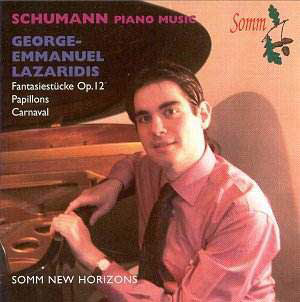Let me say right away that that reviewing the first batch of
three discs in the Somm New Horizons series has been a real pleasure.
Like EMI Classics with their Début series and Harmonia Mundi
with Les Nouveaux Interprètes, Somm are providing a forum
for new talent, young musicians whose stature is already proven but who
are still close to the beginning of their careers. Itís a more than worthwhile
exercise, as these three discs prove, as do many of the EMI and Harmonia
Mundi issues also. These are marvellous musicians who, as is the way nowadays,
have nothing to fear from their elders from the technical point of view,
and in most cases possess an extraordinary maturity and musical insight
to go with it.
The Greek pianist George-Emmanuel Lazaridis is in his
early twenties and has studied extensively in London, notably at the
Royal College of Music, as well as with some of the most eminent pianists
such as Alfred Brendel. He is also a composer with many performances
and several commissions to his credit. The disc under review seems to
be his first commercial recording.
I imagine that the chief problem in launching a series
such as this is persuading the public to buy the discs when so much
material is available played by the giants of the past. How can a young
musician hope to compete? One approach is by judicious choice of repertoire.
For her superb disc on Les Nouveaux Interprètes the cellist
Emmanuelle Bertrand chose a programme of unaccompanied twentieth century
cello music, including works written specially for her, and thus there
is no reason to compare her playing to anyone elseís. George-Emmanuel
Lazaridis has chosen another path here: his recital of early Schumann
works is core repertoire, bringing him into direct comparison with some
of the greatest pianists of modern times. Whether there is any point
in comparing his Schumann to that of Rubinstein or Arrau, Brendel, Barenboim
or Ashkenazy, is another matter. I think people will do so, all the
same, which will be a pity, because the fact is that taken in its own
terms this is most satisfying playing, and I donít see how anyone buying
this disc could be disappointed.
Joseph Weingarten, writing about the interpretation
of Schumannís piano music, says that "early compositions such asÖPapillons,
CarnavalÖare all a series of miniatures strung together like
beads on a necklace to form a single chain". The difficulty of
interpreting such works lies in the fact that each single piece, short
though it is, is at once complete in itself and part of the larger structure
into which it must be convincingly integrated. This is certainly the
case in Papillons, where some of the pieces are very short indeed,
but even more so in Carnaval, a kaleidoscope of mood, feeling,
even scene or portrait painting, and often with literary references
thrown in. The work is inspired by a love affair: Schumann, only twenty-four
himself, had fallen in love with a girl several years his junior. She
came from the town of Asch, and much of the musical material of Carnaval
is based on the four notes Ė in their German form Ė whose letters make
up the townís name. An incurable romantic, one might say. The eight
pieces which make up the Fantasiestücke tend to be slightly
longer and more self-contained, and betraying in their character the
personal and musical maturity of the slightly older composer. Yet these
pieces too are strongly associated with, and dedicated to, a lady, though
yet another, Clara, later to become his wife, also figures in the complex
picture.
Lazaridisís view of Schumannís music tends more toward
the impulsive than the reflective. Listening to older pianists, Rubinstein
in Carnaval, for instance, or Kempff in Papillons, underlines
this, and some might find this element missing from time to time. They
might also sense a certain absence of grandeur. This is not to suggest
that the gentler episodes are neglected. On the contrary, they are beautifully
executed, especially perhaps in the Fantasiestücke. But
this is all young manís music, after all, and I find Lazaridisís impulsive
but not impatient approach both convincing and true to the music. And
he rises magnificently to every technical challenge.
The piano is satisfyingly present in a warm but not
too reverberant church acoustic. There are good introductory notes by
Christopher Morley, and indeed the whole product is well presented.
Somm do their young artists proud.
I hadnít heard of George-Emmanuel Lazaridis before,
but heís certainly someone to watch out for. Anyone wanting this particular
combination of works shouldnít hesitate.
William Hedley


